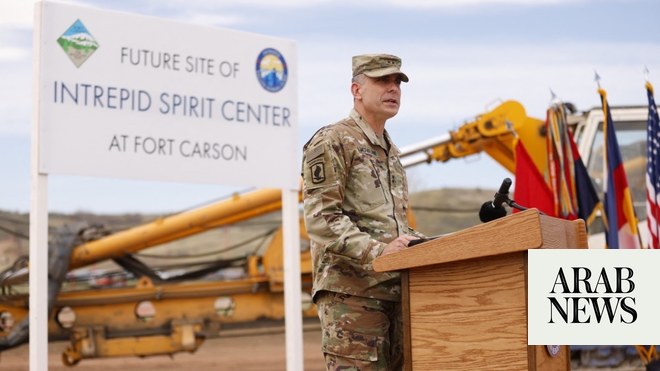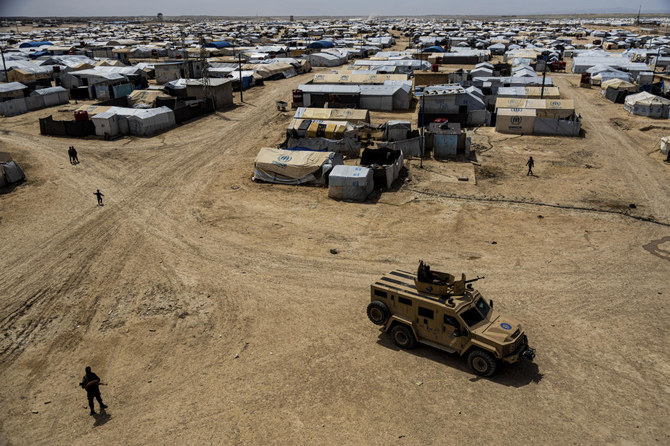
Men suspected of being Daesh wait to be searched by members of the Kurdish-led Syrian Democratic Forces after leaving the group"s last holdout of Baghouz, in Syria"s northern Deir Ezzor province on February 27, 2019. (AFP)
On March 23, just two weeks ago, one of the most gripping, harrowing tales of the rise of post-911 terrorism came to an end. The Syrian Democratic Forces, a Kurdish-led, US-backed group, routed the remnants of Daesh in the small Syrian town of Baghouz, the group’s last territorial possession.
Even though the SDF declared emphatically that the world has seen the last of Daesh, the final battle crawled to a rather tepid conclusion. Even more confusing, and much to the surprise of the US Department of Defense, was an all-too-early declaration from the White House that Daesh had been defeated. Live reports from the scene still showed a battle in full swing, as the SDF had to be cautious given the thousands of civilian hostages that Daesh fighters were using as human shields.
Regardless, Daesh would eventually be reduced to a shadow of its former self, far from the nascent terror organization determined to conquer the world.
Five years ago such an outcome seemed inconceivable. Daesh had managed to form a proto-state the size of Great Britain by driving out Iraqi government forces from parts of Western Iraq. The group also took advantage of the civil war in Syria to seize swaths of territory, which it used to expand its operations, terrorize ethnic minorities and even destroy heritage sites.
Daesh’s “successes” can largely be attributed to its recruitment of experienced fighters, including high-ranking former military and intelligence officials. In addition, civilians reeling from the endless chaos and power vacuums left after the US withdrew troops were also initially enthralled by the group, which channeled some of their same frustrations.
At the height of its power, Daesh was in complete control of Mosul and Raqqa, two of the largest cities in Iraq with combined populations in the millions. This enabled it to become a self-sustaining entity despite expanding its ranks and territorial claims so rapidly. Its financing came from illegal sales of petroleum, taxation in occupied territories, looting of banks, extortion, kidnapping and ransoms, online fundraising and even donations from wealthy Arabs masked as “humanitarian aid.”
This level of sophistication and grandiose ambitions alarmed most but what really caught the world by surprise was how fast the group expanded. This was unlike the small-cell, guerrilla insurgency tactics utilized by Al-Qaeda, for instance. Defeating Daesh was going to take a lot more than just surveillance, drone strikes and cooperation with local military, public-security, intelligence and law-enforcement operations.
A disturbing truth about terrorism, whether it is born from white nationalism or religious fundamentalism, is that all it takes is one lone wolf to upend a fragile coexistence.
Hafed Al-Ghwell
These “successes” also earned the group a veneer of legitimacy and increasing confidence in its staying power. Its tactics and creed appealed to thousands of disaffected youths across the region and even in the developed world. Many would eventually board buses, boats and planes to join the group, the origins and meteoric rise of which confounded the world at large, which fumbled initial attempts at mounting an effective opposition.
All the while, Daesh continued to grow. In just a few years, it was well financed, demonstrably capable of waging war and very effective at spreading its poison far beyond its territorial claims. The group was poised to swallow Iraq and parts of the Middle East whole. Daesh seemed unstoppable — but in a rather ironic twist, the Kurds that the group had sworn to eradicate were the ones who proved instrumental in its defeat at Baghouz.
However, Daesh is simply down. It is not yet defeated. Even before the tide began to turn, it had already scored declarations of support and allegiance from far-flung extremist groups around the world. Among the more notable was the pledge of allegiance from West Africa-based Boko Haram, in northern Nigeria. Other groups include the Caucasus Emirate in southwestern Russia, Abu Sayyaf in the Philippines, the Mujahideen Shoura Council in Gaza, and Jund Al-Khilafah in Algeria. Some other organizations were, or are, at least partially active in parts of Libya, Afghanistan, Pakistan, Brazil, India, Lebanon, Indonesia, Jordan and even Norway. The group also managed to spawn its own active branches in some of the most unstable countries outside of Syria, Libya and Iraq, where the rule of law is largely absent.
Its most active groups were in parts of east, west and southern Libya, which became more potent after the Shoura Council of Islamic Youth pledged allegiance to Daesh. Unfortunately, Libya remains unstable, as shown in the past two days.
In Sinai, remnants of the Ansar Bait Al-Maqdis extremist militant group pledged allegiance to Daesh and quickly rose to prominence by claiming responsibility for downing a Russian passenger airliner, Metrojet flight 9268. Lastly, the ongoing civil war in Yemen led to Daesh building an active presence there, directly competing for influence with Al-Qaeda in the Arabian Peninsula. Daesh joined the civil war, mounting attacks against the Zaidiyyah Houthis, unintentionally joining a US-backed effort to rid Yemen of Ansar Allah, an Islamic religious-political armed movement.
After the main group’s defeat, its influence and the connection it shared with these “cells” or supportive organizations will ensure that parts of its dangerous creed survives. In the worst-case scenario, members of these organizations could end up encouraged or radicalized by the apparent martyrdom of the group.
A disturbing truth about terrorism, whether it is born from white nationalism or religious fundamentalism, is that all it takes is one lone wolf to upend a fragile coexistence. These groups tend to become specters, ghosts or the boogeyman that simply will not go away no matter how many troops, ordnance and billions of dollars are thrown at them.
Hafed Al-Ghwell is a non-resident senior fellow with the Foreign Policy Institute at the John Hopkins University School of Advanced International Studies. He is also senior adviser at the international economic consultancy Maxwell Stamp and at the geopolitical risk advisory firm Oxford Analytica, a member of the Strategic Advisory Solutions International Group in Washington DC and a former adviser to the board of the World Bank Group.
Twitter: @HafedAlGhwell
Disclaimer: Views expressed by writers in this section are their own and do not necessarily reflect Arab News" point-of-view












